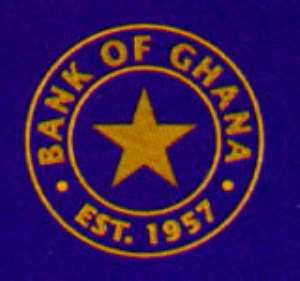
Universal banks in the country have begun an upward adjustment of their respective base lending rates in response to the Bank of Ghana's new prime rate.
The banks are expected to increase their base lending rates by between 50 and 100 basis points.
Banks' response means a tightening of the cost of credit which will directly impact on borrowing trends in the economy. But banks will be trading cautiously with regard to setting their new base lending rates, since high interest rates are likely to translate into higher loan defaults.
The Bank of Ghana increased its prime rate by 1.5% to 18.5% from 17% last week. The prime rate is the rate at which the central bank does its overnight lending to other banks; while the base lending rate is the rate at which banks lend to their most favoured customers.
The lack of immediate response to the significant hike in the prime rate has been simply because each bank has wanted to use the quantum of upward change in base lending rates announced by their competitors to determine their own hikes. Thus nobody has wanted to take the lead in announcing interest rate hikes.
The situation is further complicated by the need to factor in the influences of perched higher likelihood of loan defaults as interest rates rise and shrinking liquidity as government seeks to reduce 2008's fiscal deficit of 13.74% of Gross Domestic Product to a target for 2009 of nine percent and also squeeze rising inflation out of the economy with tight (more expensive) money.
Year-on-year inflation inched up to 19.86 at the end of January; generally, there have been major shifts in preferences on the money market away from medium and long-term instruments to short dated instruments, along with falling average maturities.
Underpinning these shifts were a somewhat dislodged inflation expectation and rising interest rates during the second half of 2008. The share of the short date securities, that is, the 91 and 182 days instrument in the outstanding stock of government securities increased by 11.1% to 45.7% after declining from 56.2% in December 2005 to 20.5% in December 2007.
However, there were significant declines in the shares of the 1-year note and 2-year fixed rate by 3.5% and 4.0% points respectively. The benchmark 91-day treasury bill rate, which rose by 1,396 basis points cumulatively in the third quarter to 24.58%, increased marginally by 8 basis points to 24.66% in the fourth quarter.
The182-day treasury bill rate also increased by 14 basis points to 26.18%, up from 26.04% at the end of the second quarter. The 1-year note and 2-year fixed rate however remained at their third quarter levels of 20% and 21 % respectively after cumulative increases of 770 and 820 basis points in the year through the third quarter.
The overnight interbank rate also increased by 7 basis points in the fourth quarter to 19.39%, up from 14.48% at the end of the second quarter.




 Akufo-Addo commissions Phase II of Kaleo solar power plant
Akufo-Addo commissions Phase II of Kaleo solar power plant
 NDC panics over Bawumia’s visit to Pope Francis
NDC panics over Bawumia’s visit to Pope Francis
 EC blasts Mahama over “false” claims on recruitment of Returning Officers
EC blasts Mahama over “false” claims on recruitment of Returning Officers
 Lands Minister gives ultimatum to Future Global Resources to revamp Prestea/Bogo...
Lands Minister gives ultimatum to Future Global Resources to revamp Prestea/Bogo...
 Wa Naa appeals to Akufo-Addo to audit state lands in Wa
Wa Naa appeals to Akufo-Addo to audit state lands in Wa
 Prof Opoku-Agyemang misunderstood Bawumia’s ‘driver mate’ analogy – Miracles Abo...
Prof Opoku-Agyemang misunderstood Bawumia’s ‘driver mate’ analogy – Miracles Abo...
 EU confident Ghana will not sign Anti-LGBTQI Bill
EU confident Ghana will not sign Anti-LGBTQI Bill
 Suspend implementation of Planting for Food and Jobs for 2024 - Stakeholders
Suspend implementation of Planting for Food and Jobs for 2024 - Stakeholders
 Tema West Municipal Assembly gets Ghana's First Female Aircraft Marshaller as ne...
Tema West Municipal Assembly gets Ghana's First Female Aircraft Marshaller as ne...
 Dumsor is affecting us double, release timetable – Disability Federation to ECG
Dumsor is affecting us double, release timetable – Disability Federation to ECG
